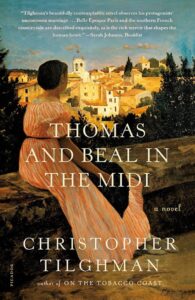In Thomas and Beal in the Midi, a young interracial couple from America tests the tolerance of Belle Époque France and its own commitment to a marriage that could not be permitted in Post-Reconstruction Maryland.
 Thomas Bayly and Beal Terrell, the white son of a landowner and the Black daughter of the farmworker on a Chesapeake estate escape to France in order to live as husband and wife. They begin their lives in Paris, where Beal, beautiful, indelible, thrives as the subject of fascination among a gaggle of American artists. Thomas struggles to plan a future and decides to buy a winery in the Southwestern region of France called Languedoc. They move to this rugged landscape and Thomas begins his career as a vigneron, but it is here, back in the farm life she thought she had left for good, that Beal must figure out what her marriage has made of her and who she wants to be.
Thomas Bayly and Beal Terrell, the white son of a landowner and the Black daughter of the farmworker on a Chesapeake estate escape to France in order to live as husband and wife. They begin their lives in Paris, where Beal, beautiful, indelible, thrives as the subject of fascination among a gaggle of American artists. Thomas struggles to plan a future and decides to buy a winery in the Southwestern region of France called Languedoc. They move to this rugged landscape and Thomas begins his career as a vigneron, but it is here, back in the farm life she thought she had left for good, that Beal must figure out what her marriage has made of her and who she wants to be.
Buy now: Amazon • Barnes & Noble • Indiebound
Reviews
“Third in his acclaimed Mason saga, Tilghman’s beautifully contemplative novel observes his protagonists’ uncommon marriage, showing how each must come into his own separately before they can flourish as a couple . . . Alongside Beal and Thomas and their skillfully delineated journeys to maturity, many secondary characters also stand out, including a kindly nun and a difficult Jewish painter with unique insight into Beal’s state of mind. Belle Époque Paris and the southern French countryside are described exquisitely, as is the rich terroir that shapes the human heart.” ―Booklist
“Tilghman expands his Mason family saga with this elegant novel about an interracial couple resettling in fin-de-siècle France to escape American miscegenation laws . . . Tilghman’s story revisits themes from his best work: how family nurtures and oppresses, how land brings prosperity and ruin, and how American character is strengthened by enterprise and haunted by the past. This is an appealingly contemplative and compassionate novel.” ―Publishers Weekly
“Lushly written . . . A recurring theme of innocent, even naïve Americans coming to understand worldly Europe recalls Henry James, as do the novel’s astute psychological insights. Tilghman’s prose can be seductively lovely, and he creates engaging, often surprising characters. This historical novel’s evocative descriptions of fin de siècle France and skillfully drawn characters add up to a sensitive and satisfying portrait of a marriage.” ―Kirkus Reviews
